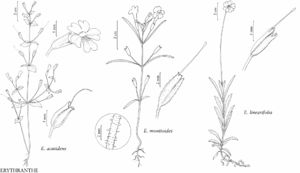Difference between revisions of "Erythranthe linearifolia"
Phytoneuron 2012-39: 35. 2012.
FNA>Volume Importer |
FNA>Volume Importer |
||
| Line 22: | Line 22: | ||
|name=M. linearifolius | |name=M. linearifolius | ||
|authority=(A. L. Grant) Pennell | |authority=(A. L. Grant) Pennell | ||
| − | }}{{Treatment/ID/Synonym | + | }} {{Treatment/ID/Synonym |
|name=M. primuloides subsp. linearifolius | |name=M. primuloides subsp. linearifolius | ||
|authority=(A. L. Grant) Munz | |authority=(A. L. Grant) Munz | ||
| Line 40: | Line 40: | ||
|elevation=600–2800 m. | |elevation=600–2800 m. | ||
|distribution=Calif. | |distribution=Calif. | ||
| − | |discussion=<p>Erythranthe linearifolia is endemic to serpentine substrates in Shasta, Siskiyou, and Trinity counties; typical E. primuloides occurs in the same area but not on serpentine. Erythranthe linearifolia is distinct from E. primuloides especially in its narrow leaves and cespitose habit. A collection from Tulare County appears to be E. linearifolia (Shevock 10597, CAS), but this appears to be far out of range and the voucher should be reexamined; it probably is better identified as an unusual collection of E. primuloides.</p> | + | |discussion=<p><i>Erythranthe linearifolia</i> is endemic to serpentine substrates in Shasta, Siskiyou, and Trinity counties; typical <i>E. primuloides</i> occurs in the same area but not on serpentine. <i>Erythranthe linearifolia</i> is distinct from <i>E. primuloides</i> especially in its narrow leaves and cespitose habit. A collection from Tulare County appears to be <i>E. linearifolia</i> (Shevock 10597, CAS), but this appears to be far out of range and the voucher should be reexamined; it probably is better identified as an unusual collection of <i>E. primuloides</i>.</p> |
|tables= | |tables= | ||
|references= | |references= | ||
| Line 64: | Line 64: | ||
|publication year=2012 | |publication year=2012 | ||
|special status=Selected by author to be illustrated;Endemic | |special status=Selected by author to be illustrated;Endemic | ||
| − | |source xml=https://jpend@bitbucket.org/aafc-mbb/fna-data-curation.git/src/ | + | |source xml=https://jpend@bitbucket.org/aafc-mbb/fna-data-curation.git/src/8f726806613d60c220dc4493de13607dd3150896/coarse_grained_fna_xml/V17/V17_1293.xml |
|genus=Erythranthe | |genus=Erythranthe | ||
|species=Erythranthe linearifolia | |species=Erythranthe linearifolia | ||
Revision as of 14:57, 18 September 2019
Perennials, rhizomatous, densely cespitose, forming large patches and turfs 0.3–1 m diam. Stems erect to ascending, simple, 2–10 cm, sparsely hirsute and stipitate-glandular, internodes shortened. Leaves basal or near basal, sometimes proximal cauline, subrosulate; petiole 0 mm; blade 1-veined or palmately 3-veined, linear to narrowly oblanceolate, 15–50 × 1.5–5 mm, base long-cuneate, often subclasping, margins entire, dentate-serrate, or distally dentate, apex acute, surfaces glabrous or adaxial sparsely short-pilose, eglandular. Flowers herkogamous, 1. Fruiting pedicels (40–)65–85(–120) mm, glabrous or sparsely stipitate-glandular near base. Fruiting calyces winged- or plicate-angled, tubular-campanulate, weakly or not inflated, 9–10(–12) mm, glabrous. Corollas yellow, red-spotted or -striped, bilaterally symmetric, weakly bilabiate, loosely hirsute on abaxial side of opening; tube-throat narrowly campanulate, 18–22 mm, exserted beyond calyx margin; lobes broadly obovate-oblong, apex rounded- or truncate-notched, throat open. Styles glabrous. Anthers included or slightly exserted, margins ciliate, glabrous. Capsules included, 6–7 mm.
Phenology: Flowering Jul–Sep.
Habitat: Wet banks, Darlingtonia seeps and bogs, seepages in serpentine talus.
Elevation: 600–2800 m.
Discussion
Erythranthe linearifolia is endemic to serpentine substrates in Shasta, Siskiyou, and Trinity counties; typical E. primuloides occurs in the same area but not on serpentine. Erythranthe linearifolia is distinct from E. primuloides especially in its narrow leaves and cespitose habit. A collection from Tulare County appears to be E. linearifolia (Shevock 10597, CAS), but this appears to be far out of range and the voucher should be reexamined; it probably is better identified as an unusual collection of E. primuloides.
Selected References
None.
